Who is Blessed?
Learning from the Beatitudes
In his teaching on the Beatitudes, Jesus flips the script on who will receive his Kingdom, the character of those in his Kingdom, and what we might expect if we seek his Kingdom above all else. Since this doesn’t come “naturally” to us, you are invited to pause, reflect, and consider how to yield to Christ’s beatitude.
To accompany each week's teaching, we'll provide a reflection guide here, along with a deeper look at the week's art, which was all created especially for this sermon series by Hannah Hammond (Schorr), daughter of Kathy and Steve Schorr.
Hannah is an artist and writer who loves exploring the convergence of art, faith, motherhood, and social transformation. She spent many wonderful years at FPC in Midland, and now she lives in Phoenix, Arizona with her husband, Ellis, and their two children, Ruth and Baker. You can follow Hannah’s work on Instagram @hanhammondart.

This painting series explores the upside-down nature of the Beatitudes, the nine blessings of Jesus from his Sermon on the Mount. Each one is surprising in its own way as Jesus flips the script on who will receive his Kingdom, the character of those in his Kingdom, and what we might expect if we seek this Kingdom above all else.
Tim Mackie of the Bible Project shares that the Kingdom, or as he translates, the Kingdom of the Skies, is “God’s heavenly reality, where everything is done according to God’s good will. And that’s what Jesus is bringing here to the land for people to experience now.” Each Beatitude expands our imagination of the good life—the life of flourishing God intended and desires for all of humanity not just in the future, but here and now.
The paintings include nine different plants native to the Holy Land that represent each Beatitude, which I will share more detail about throughout the summer. They are growing upside-down as a representation of how God’s kingdom grows in us and in our world in unlikely ways and through unlikely people.
Lastly, these paintings reflect one of the more personally transformative themes of the Beatitudes: instead of growth as an endless race to the top, Christ invites us to grow down in humility, generosity, and self-sacrificial love. And that’s the good life! --HH
WATCH THIS WEEK'S SERVICE
LISTEN TO THIS WEEK'S SERMON: Spotify or Apple Podcast
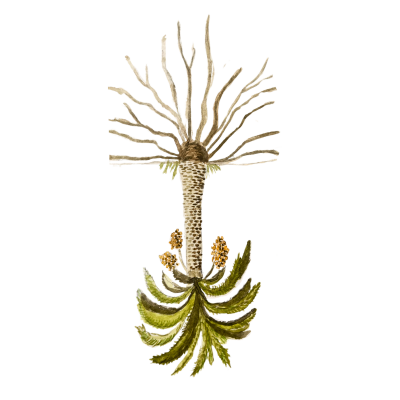
Hannah Hammond, The Date Palm, watercolor
READ ABOUT THIS WEEK'S ART AND ACCOMPANYING BLESSING
PAUSE
Pause to be still; to breathe slowly, to re-center your scattered senses upon God’s presence.
Prayer of Approach
God of mercy, grace and justice, as I open my heart to you now,
comfort me where I am unsettled, and unsettle me where I am comfortable.
Challenge me and change me, disturb and rearrange me,
not just for my own sake, but for the sake of others and for Your Kingdom. Amen*
REFLECT
Matthew 5:1-3: "When Jesus saw the crowds, he went up on a mountainside and sat down. His disciples came to him and he began to teach them. Blessed are the poor in spirit for theirs is the kingdom of heaven."
Jesus extends his blessings in his kingdom – but not to those we might expect. The “poor in spirit” refers to a people who are impoverished (lacking in) spiritual vitality, who are powerless, who aren’t religiously significant, whose life energy (ability to get up and do things in the world) is deprived (Bible Project).
Read Matthew 5:1-3 again.
Jesus says that life is good; that there is blessing for those who find themselves in this condition. “The Son of God simply blesses broken people. The Beatitudes must first be heard as grace, or they will not be heard correctly.”** John Ortberg says, “We come just as we are to God and to one another to be loved and healed. Everybody is welcome, nobody is perfect, anything is possible. Rule number one in the Jesus community is ‘No Pretending.’”
YIELD
Instead of the “Poor in Spirit” being last, they are welcomed first into Jesus’ Kingdom. Perhaps one way of opening ourselves to Jesus’ invitation and blessing is to “waste time” with God. Good friends get together without any agenda. One way we might discover what we’re lacking in our relationship with the Lord (or at least find ourselves open to what the Lord might reveal about what we are lacking – joy, for instance – is very counter-intuitive. Imagine taking a walk with Jesus, or Jesus’ joining you for a cup of coffee. Would you be open to hearing what he says about the state of your “spirit”? Could you telling him about where you feel impoverished?
WATCH THIS WEEK'S SERVICE
LISTEN TO THIS WEEK'S SERMON: Spotify or Apple Podcast
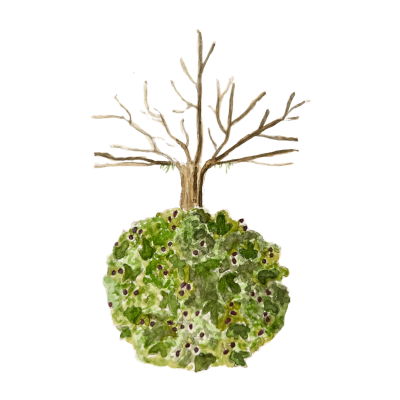
Hannah Hammond, The Fig Tree, watercolor
READ ABOUT THIS WEEK'S ART AND ACCOMPANYING BLESSING
PAUSE
Pause to be still; to breathe slowly, to re-center your scattered senses upon God’s presence.
Prayer of Approach
God of mercy, grace and justice, as I open my heart to you now,
comfort me where I am unsettled, and unsettle me where I am comfortable.
Challenge me and change me, disturb and rearrange me,
not just for my own sake, but for the sake of others and for Your Kingdom. Amen*
REFLECT
Matthew 5:1-4
"When Jesus saw the crowds, he went up on a mountainside and sat down. His disciples came to him and he began to teach them. Blessed are the poor in spirit for theirs is the kingdom of heaven. Blessed are those who mourn for they will be comforted. Jesus extends his blessings in his kingdom – but not to those we might expect. Rarely would we put the notion of the good life (or blessed) with the word mourn. In many cultures mourning is the result of a curse. Of course, Jesus’ point wasn’t that a person needed to mourn in order to be blessed. Rather, it is precisely because mourning is such a painful and lonely experience that Jesus’ words are so powerful. As unsettling as mourning is, whether it’s our own sorrow or someone else’s, most of us are apt to shy away from it, medicate it, distract from it, ignore or even deny it. But Jesus plants himself squarely in the middle of it. Jesus looks it in the face, reaches out, and touches it.**
Mourning isn’t just about death. People mourn and grieve all sorts of losses: the loss of a marriage, a job, a failure, a season of life coming to an end, even hurtful words from a friend.
The folks at the Bible Project suggest that when it comes to grieving, we must “steer into the skid” . . . the good life is for those who have a capacity for grief. Those who don’t pretend or ignore or deny such losses.”
YIELD
Dallas Willard say, “As we see the Kingdom in Jesus, enter it, learn to live in it, we find comfort - even joy.” On the hill the day Jesus gave the sermon on the mount, some people there experience healing and comfort that very day. But not everyone. There were some who were not healed and many who would experience devastating losses in the days and years ahead.
Hannah’s artwork this week is an upside down fig tree. In John 1:45-49, we are told of Jesus’ encounter with Nathaniel. Jesus tells Nathaniel, “I saw you under the fig tree.” Like us, Nathaniel’s walls are up. He’s suspicious, doubtful for reasons we don’t know. “In suffering, in loss, in the unimaginable sorrow of grief, God SEES us, knows us, and loves us.”
Mysteriously, wonderfully, this comfort comes when we feel seen by God and by one another. Unfortunately, often the Church, our brothers and sisters in Christ fail to SEE one another or be with one another in times of grief. Interestingly, those who are best at helping and healing others in the midst of grief are also the one who have or are going through it.
Who do you know right now that has something to mourn? How can you pray for them and be a comforting presence in their life this week? More than 2000 years after Jesus offered this blessing, we know that grief and joy are not mutually exclusive. In fact, they are interlaced. The solid hope of Jesus’ Kingdom gives the great comfort.
The worst isn’t the last thing about the world. It’s the next to the last thing. The last thing is the best. It’s the power from on high that comes down into the world, that wells up from the rock- bottom worst of the world like a hidden spring. Can you believe it? The last, best thing is the laughing deep in the hearts of the saints, sometimes in our hearts even. Yes. You are terribly loved and forgiven. Yes. You are healed. All is well.
-Frederick Buechner, The Final Beast
WATCH THIS WEEK'S SERVICE
LISTEN TO THIS WEEK'S SERMON: Spotify or Apple Podcast
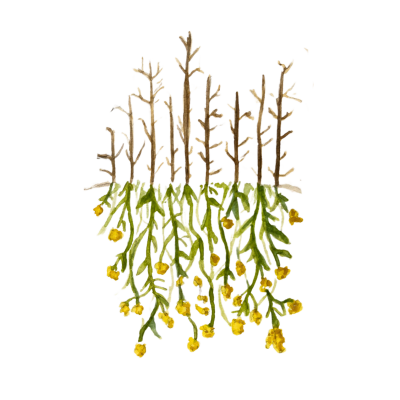
Hannah Hammond, Mustard, watercolor
READ ABOUT THIS WEEK'S ART AND ACCOMPANYING BLESSING
PAUSE
Pause to be still; to breathe slowly, to re-center your scattered senses upon God’s presence.
Prayer of Approach
God of mercy, grace and justice, as I open my heart to you now,
comfort me where I am unsettled, and unsettle me where I am comfortable.
Challenge me and change me, disturb and rearrange me,
not just for my own sake, but for the sake of others and for Your Kingdom. Amen*
REFLECT
Matthew 5:5 “Blessed are the meek, for they will inherit the earth.” (NIV)
“How good is life for the unimportant, because they will inherit the land.” (Bible Project)
Jesus extends his blessings in his kingdom – but not to those we might expect. John Ortberg writes, “Nobody in the world, apart from God, puts meek people on “the good life” fast track! No company has a “Meek Employee of the Month” award... Blessed are the charisma-challenged. Blessed are the inept self-promoters, for you will inherit the earth as up there comes down here.”
The Greek word, praus, which is often translated as meek but can also refer to the unimportant, the overlooked, the cast aside or the not taken seriously.** In the world, the meek don’t seem to inherit anything. They get pummeled because they get run over so often. However, Moses was described as “…meek, more than all people who were on the face of the earth.” Numbers 12:3 (KJV). Jesus has also been described as “meek and mild.” Praus it appears also refers to “strength under control.” Could it be that the meek aren’t just pushovers, but rather those who refuse to take the bait and resist the temptation to flee or to join the fight? The meek are those who choose the way of self-sacrificial love, humility, and Christlike service of others.
Inheritance and land ownership have always been symbols of power, wealth, and authority. In this beatitude, Jesus turns the tables and announces that it is God who will divide the inheritance, and in his Kingdom, the inheritance will be given to those who seem unimportant, on the margins, the B team – the meek!
Jesus’ listeners probably had heard Psalm 37. Read Psalm 37. Where do you see “strength under control” in the Psalm?
YIELD
Hannah’s artwork this week is an upside-down mustard plant. Jesus spoke of mustard seeds in Matthew 13 and 17, emphasizing that the Kingdom of God grows from small, ordinary, and seemingly insignificant people and circumstances. We see this on display through the Gospels in Jesus person and ministry, but also in the early church (see the book of Acts).
The example of Moses (Numbers 12, where Aaron & Miriam are criticizing Moses) helps us to see that there will be plenty of opportunities within our own families to exercise “strength under control,” forbearance, and self-sacrifice.
However, we also remain aware that this blessing shocks and disrupts the power structures present in Jesus’ day and ours. For those of us who have some earthly influence, power, wealth and authority there is a blessing for us in “moving closer to the margins.” Father Gregory Boyle offers an invitation “…to move closer to the margins so that the margins themselves will be erased. We stand there with those whose dignity has been denied. We locate ourselves with the poor and the powerless and the voiceless. At the edges, we join the easily despised and the readily left out. We stand with the demonizing so that demonizing will stop. We situate ourselves right next to the disposable so that the day will come when we stop throwing people away.”
What are the places where you see those considered unimportant or “on the edge”? Is there someone that God has put on your mind who is meek but maybe has never heard Jesus’ blessing?
WATCH THIS WEEK'S SERVICE
LISTEN TO THIS WEEK'S SERMON: Spotify or Apple Podcast

Hannah Hammond, Wheat, watercolor
READ ABOUT THIS WEEK'S ART AND ACCOMPANYING BLESSING
WATCH THIS WEEK'S SERVICE
LISTEN TO THIS WEEK'S SERMON: Spotify or Apple Podcast

Hannah Hammond, Lemon Tree, watercolor
READ ABOUT THIS WEEK'S ART AND ACCOMPANYING BLESSING
WATCH THIS WEEK'S SERVICE
LISTEN TO THIS WEEK'S SERMON: Spotify or Apple Podcast
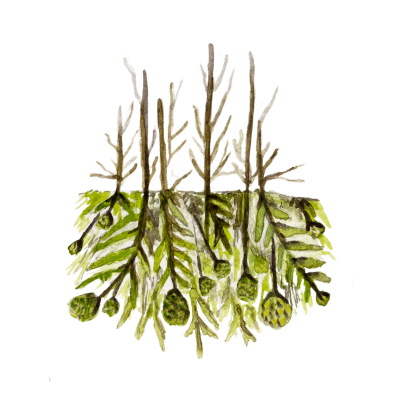
Hannah Hammond, Artichoke, watercolor
READ ABOUT THIS WEEK'S ART AND ACCOMPANYING BLESSING
PAUSE
Pause to be still; to breathe slowly, to re-center your scattered senses upon God’s presence.
Prayer of Approach
God of mercy, grace and justice, as I open my heart to you now,
comfort me where I am unsettled, and unsettle me where I am comfortable.
Challenge me and change me, disturb and rearrange me,
not just for my own sake, but for the sake of others and for Your Kingdom. Amen*
REFLECT
Matthew 5:8 “Blessed are the pure in heart, for they will see God.” (NIV)
“How good is life for the pure in heart, because they will see God.” (Bible Project)
The teachers of Jesus time blessed the outward, visible things like the study of Scripture (the OT for them), times or ways of prayer, specific religious practices (many of which involved the Sabbath or dietary laws). We would likely label these as good, but later in the sermon on the mount Jesus specifically warned them and us about “practicing piety” before other, particularly that we can be seen by others.
In the 6th beatitude Jesus is specifically blessing people “at center,” at our core – people who have a pure heart. The Hebrew word is leb. The Greek word is kardia. In Hebrew psychology the “heart” is literally the human center, the home of personal feeling, willing, thinking. Heart, will and mind are covered by the biblical term “heart.”***
Later in Matthew (23:27-28) makes the distinction clear for the religious leaders of his day. Doing all the right things and saying all the right things so that it appears as though you’ve got clean hands and a pure heart is not what God had in mind. Jesus calls them hypocrites. In our day we might use the word poser.
Pause for just a moment and re-read Proverbs 4:20-27, Matthew 5:8, and Matthew 23:27-28. Hypocrisy is often a term we use when thinking about others, but Jesus in the beatitude and elsewhere beckons us to look, first, at ourselves. Any ways that you sense you are posing or pretending when it comes to being honest about the state of your heart?
YIELD
Hannah’s artwork this week is an upside-down artichoke. (I didn’t know that artichokes are actually flowers, not vegetables!) They have tender hearts surrounded by thorny petals. It’s only after removing the thorns, layer by layer, that you can get to the heart. So it is with us, too!
Perhaps the most challenging part of this blessing is the word “pure.” As followers of Jesus, we know that purity is a gift (not an achievement or something we can pull off ourselves). When living in this world, purity is also a struggle. As Jesus pointed out to the religious leaders of his day, when we assert human definitions of purity they will always be skewed, warped and hold great potential for evil. Where or how have you see notions of purity become skewed or harmful?
Way back in the OT (1 Samuel 16) we learn that “… the Lord does not see as mortals see; they look on outward appearance, but the Lord looks on the heart.” (vs 7). The truth for all of us is, our hearts are vulnerable (broken, wounded, hurt, or afraid), not pure. As Hannah writes, “We all know how easily our internal motivations bend toward self-interest. Even in our great moments of compassion, humility, and self-sacrifice, there can be tinges of ego.
Jesus’ blessing is also an invitation that those of us who are impure of heart can somehow become pure in heart. The transformation begins with honesty.
This week perhaps you could make the prayer in Psalm 139:23-24 part of a daily “examen.” Search me, O God, and know my heart…” Or you could try going one whole day without telling even one lie – even the little “white” ones. Or you could eat an artichoke with family or a close friend and while you are removing the thorny petals talk honestly about what is happening in your heart. Also listen for what’s happening the in other’s hearts. Such things help clear our vision and step into the promise that we will see God!
WATCH THIS WEEK'S SERVICE
LISTEN TO THIS WEEK'S SERMON: Spotify or Apple Podcast
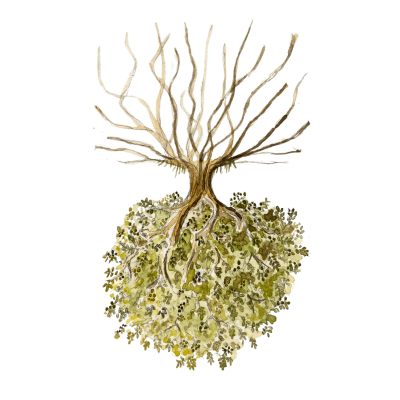
Hannah Hammond, Olive Tree, watercolor
READ ABOUT THIS WEEK'S ART AND ACCOMPANYING BLESSING
Pause to be still; to breathe slowly, to re-center your scattered senses upon God’s presence.
Prayer of Approach
God of mercy, grace and justice, as I open my heart to you now,
comfort me where I am unsettled, and unsettle me where I am comfortable.
Challenge me and change me, disturb and rearrange me,
not just for my own sake, but for the sake of others and for Your Kingdom. Amen*
Matthew 5:9 “Blessed are the peacemakers, for they will be called children of God.” (NIV)
“How good is life for the peacemakers, because they will be called children of God.” (Bible Project)
“Peacemakers make the list (of Jesus’ blessing) because outside the kingdom of God, they are called everything but children of God,” writes Dallas Willard. “That is because they are always in the middle. Ask the policeman called in to smooth out a domestic dispute. There is no situation more dangerous. Neither side trusts you. Because they know that you are looking at both sides, you can’t possibly be on their side.”
However, under God’s rule there is recognition that in bringing good to people who are in the wrong (as both sides usually are) you show the divine family resemblance. Jesus ministry was precisely about reconciling people back to God and to one another.
Peace is sometimes referred to as inner tranquility (peace of mind) or to an outward state – the absence of war. This is not what Jesus is talking about in this blessing. The biblical word is shalom which conveys the picture of communal well-being in every direction and in every relation. (Take a look at Jeremiah 29:4-11. The Hebrew people have been taken from their homes/country into exile. Surprisingly, God says they are to seek the shalom (the welfare, prosperity, well-being, peace) of the city of Babylon and in so doing they will find their own shalom. Peace making!
Pause for just a moment and identify 3 or 4 “arenas” of your life where there is conflict. It could be family, work, school, church, community, country world. Try to be specific about the people or groups.
Hannah’s artwork this week is an upside-down olive tree. Where might you have opportunity to “extend an olive branch?”
The folks at the Bible Project helpfully show how our living into the beatitudes begins to add up (help us mature). Those who long for a world made right (hunger & thirst for righteousness), begin to offer generous mercy (the merciful), from the right motive (pure in heart) will find
themselves involved in arenas of conflict and there show themselves to be members of God’s family.
How would we begin?
WATCH THIS WEEK'S SERVICE
LISTEN TO THIS WEEK'S SERMON: Spotify or Apple Podcast
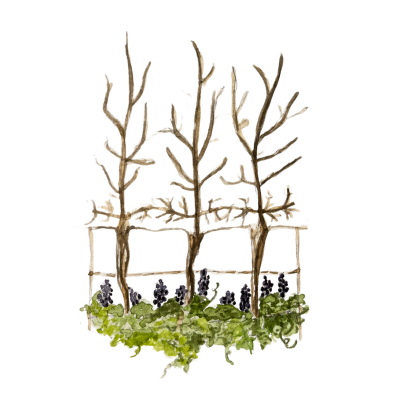
Hannah Hammond, Grapevine, watercolor
WATCH THIS WEEK'S SERVICE
LISTEN TO THIS WEEK'S SERMON: Spotify or Apple Podcast
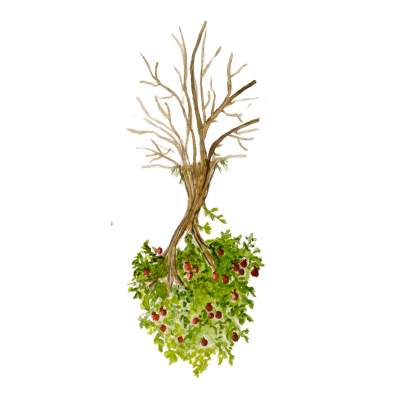
Hannah Hammond, Pomegranate, watercolor